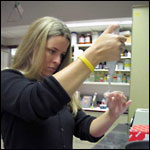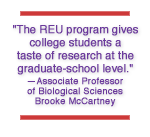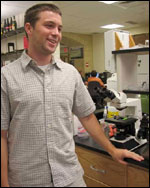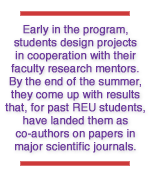|
|
||||||
|
|
Research Experiences for Undergraduates: Training Tomorrow's Scientists
To literally "see" some answers, Stern is optimizing a molecular construct that includes the gene c-fos, which turns on when neurons are activated, and Timer, a fluorescent protein that changes color over time. Barth hopes to use this construct to determine when and for how long particular neurons have been active.
Stern is part of a unique group of undergraduates participating in Carnegie Mellon's Research Experiences for Undergraduates (REU) program. This week, he and nine other students in this summer's REU are presenting the results of their 10-week research projects.
Scientific puzzles initially should be confusing, according to David Hackney, REU program director and professor of biological sciences. "Research often involves feeling more confused as you make progress, arriving at findings that lead to even more questions. It's also creative in that researchers often need to devise new models to fit expanding bodies of data."
Run by Carnegie Mellon's department of biological sciences and funded by the National Science Foundation, the REU program gives students the opportunity to conduct advanced mentored research projects in labs of faculty who specialize in such areas as molecular biology and genetics, cell and developmental biology, neuroscience, biochemistry, structural biology, and computational biology.
"The REU program gives college students a taste of research at the graduate-school level," said Associate Professor of Biological Sciences Brooke McCartney, a 1992 Carnegie Mellon REU alumna who now co-directs the program and serves as a faculty research mentor.
Early in the program, students design projects in cooperation with their faculty research mentors. By the end of the summer, they come up with results that, for past REU students, have landed them as co-authors on papers in major scientific journals, including Biochemistry and Molecular Biology of the Cell.
Like McCartney, many REU students find the research core of the program to be a defining moment in their early scientific careers. In recent years, nearly 70 percent of alumni of Carnegie Mellon's REU have entered Ph.D. programs in the sciences. The rest have gone to medical school or directly into scientific employment.
Like many of her REU predecessors, Claudia Lins has found her program research to be a pivotal moment. A rising senior with a molecular biology major and chemistry minor at New Jersey's Montclair State University, Lins has what she jokingly calls "science genes." Her father is a pharmacist and her mother a biochemist, and she has always found math and science classes to be her favorites.
Before her experience in Carnegie Mellon's REU program, Lins was considering master's degree programs in science. Now, she says she will definitely pursue a Ph.D. Of scientific research, she recently said, "This is what I was born to do."
Kate R. Hough |
||||
|
Carnegie Mellon Home |
||||||

 A native of New Castle and rising senior at Saint Vincent College in Latrobe who plans to eventually earn a Ph.D. Stern came to the REU because it allowed him, for the first time, to have a lengthier, more involved research experience than had been possible in his college science courses.
A native of New Castle and rising senior at Saint Vincent College in Latrobe who plans to eventually earn a Ph.D. Stern came to the REU because it allowed him, for the first time, to have a lengthier, more involved research experience than had been possible in his college science courses.

 This summer, Lins is working in the lab of A. Javier López, an associate professor of biological sciences, where she is helping López's research team address a puzzle that is fairly new—how an activity called recursive RNA splicing functions in the processing of large genes. Lins has been focusing on sites in a gene of the fruit fly Drosophila that are suspected to be key to recursive splicing. She has generated mutations at the sites to see how these specific mutations affect the process of recursive splicing as a whole. Her work, together with that of López and other researchers in the lab, could have profound implications for research on the molecular basis of life-threatening diseases like cystic fibrosis.
This summer, Lins is working in the lab of A. Javier López, an associate professor of biological sciences, where she is helping López's research team address a puzzle that is fairly new—how an activity called recursive RNA splicing functions in the processing of large genes. Lins has been focusing on sites in a gene of the fruit fly Drosophila that are suspected to be key to recursive splicing. She has generated mutations at the sites to see how these specific mutations affect the process of recursive splicing as a whole. Her work, together with that of López and other researchers in the lab, could have profound implications for research on the molecular basis of life-threatening diseases like cystic fibrosis.